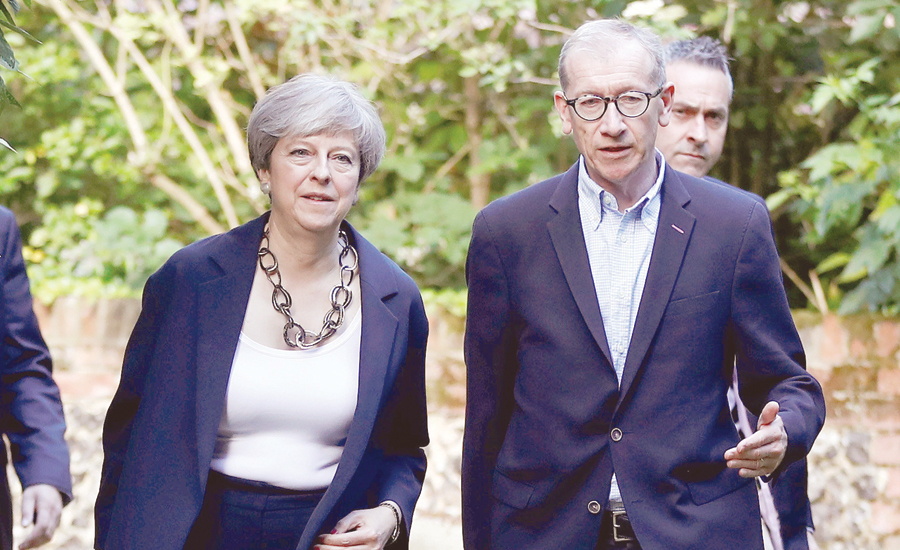

IN THE RACE: Labour leader Jeremy Corbyn said he could still be prime minister -
LONDON: British Prime Minister Theresa May was on Sunday seeking a deal with a small Northern Irish party that she needs to stay in power after a disastrous election destroyed her authority days before Brexit talks are due to start.
May’s grip on power was tenuous after she gambled away a parliamentary majority in an election she did not need to call. Conservative Party loyalists urged her to change her leadership style, while critics talked about her days being numbered.
“Theresa May is a dead woman walking. It’s just how long she’s going to remain on death row,” former Conservative finance minister George Osborne, who was sacked by May when she became prime minister last year, told the BBC.
The Conservatives won 318 House of Commons seats in Thursday’s election, eight short of an outright majority. Labour, the main opposition party, won 262.
Labour leader Jeremy Corbyn said he could still be prime minister, although his party has no obvious way to build a majority coalition. He said a new election might be necessary later this year or early in 2018.
The political turmoil comes a week before Britain is due to start negotiating the terms of its exit from the European Union in talks of unprecedented complexity that are supposed to wrap up by the end of March 2019, when Britain actually leaves.
That timeline now looks even more ambitious than before, not least because May’s electoral debacle has emboldened those within her own party who object to her “hard Brexit” approach of leaving the European single market and customs union.
May’s only hope of forming a government now is to win support from Northern Ireland’s Democratic Unionist Party, which won 10 seats. She is seeking a so-called confidence and supply deal, which would involve the DUP supporting the Conservatives on key votes but not joining a formal coalition. DUP leader Arlene Foster told Sky News she would meet May on Tuesday.
The prospect of being propped up by the socially conservative DUP, which is strongly focused on Northern Ireland’s specific political complexities, was causing concerns in the Conservative party, senior lawmaker Graham Brady said.
“I think there is concern about the policies of the DUP, the domestic policies in Northern Ireland, but I think it’s pretty clear that any arrangement that is reached is not going to be a full coalition,” he told BBC Radio 4. The DUP is strongly opposed to single-sex marriage and abortion, which is at odds with Conservative policies.
There are also concerns about the potential impact of the proposed arrangement on Northern Ireland’s peace agreement, which relies in part on London being an impartial arbiter between those, such as the DUP, who want the province to remain in the United Kingdom and those who want it to be part of Ireland.
“There has been a lot of hyperbole about the DUP since Thursday,” Foster said. “Just to be clear, we will act in the national interest. We want to do what is right for the whole of the UK.”
Asked whether a Conservative-DUP deal would endanger the peace agreement, Irish Foreign Minister Charlie Flanagan told ITV: “Not necessarily the case. It remains to be seen what the nature of that deal is.”
But he said Ireland was anxious for the Brexit talks to go ahead despite the turmoil in London, and for the deal that they produce not to damage peace in Northern Ireland.
After Brexit, the border between Northern Ireland and the Irish Republic will be the only land border between the United Kingdom and the European Union, raising concerns over the potential return of border checks that could stoke tensions.
But lawmaker Brady said Britain had no alternative to a Conservative-DUP deal, other than a new election, which he said the public did not want.
May’s Downing Street office had announced on Saturday that the “principles of an outline agreement” had been agreed with the DUP, only for the smaller party to contradict that account hours later.
Downing Street backtracked, saying she had “discussed finalising” a deal in the coming week. — Reuters
Oman Observer is now on the WhatsApp channel. Click here



